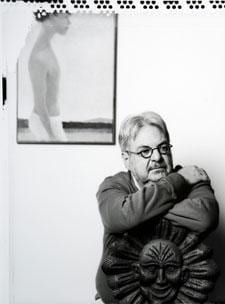Being a gay teenager is tumultuous. The process of coming to understand oneself, coming out to the world and finding that elusive first love is as hard for some today as it ever was.
Gay Québécois playwright Michel Tremblay has used this rich subject matter as fodder for his new play, Fragments de mensonges inutiles (Fragments of Useless Lies), which has its Toronto premiere at Théâtre français de Toronto on April 28.
Performed in French, with English surtitles at some performances, the piece tells parallel stories, set 50 years apart, of two gay teenaged boys, Jean-Marc and Manu, and their families. What is striking about the text is not so much what has changed in the lives of gay teens since the mid-20th century, but how much remains the same.
“When you are going through the process of discovering that you’re gay, it’s always the same, no matter what time you are living in,” says Tremblay, on the phone from Key West, where he lives for part of each year. “Society has evolved over time to be more accepting, but that doesn’t mean that individuals have evolved. The process of coming out to your family is still as difficult as it ever was.”
The play moves back and forth in time between the 1950s and the late 2000s. In the 1950s, Jean-Marc’s father has the biggest struggle with his son’s homosexuality, while his mother is able to come to a sort of acceptance, though she prays her son won’t become a drag queen like his uncle. In the contemporary story, Manu’s father is relatively unfazed by his son’s sexuality, and it is his mother who faces the bigger struggle.
“Fragments is as much about the parents as it is about the children,” Tremblay says.
“Any parent feels a sense of loss when their child tells them they won’t grow up to be the person they had expected them to be, though some have an easier time dealing with it than others.”
Many of the characters in Tremblay’s expansive catalogue are based on people from his own life, including himself, and they often make appearances in multiple works. Jean-Marc was first introduced in the 1981 play Remember Me, and has reappeared in several other plays and Tremblay’s novel The Heart Laid Bare.
“Jean-Marc has been my alter ego for the last 30 years,” Tremblay says. “When I first wrote about him, he was quite close to how I was, though he’s evolved and changed over time.”
Not surprisingly, Fragments is deeply influenced by Tremblay’s own life, growing up gay in the heavily Catholic Quebec of the 1950s.
“The first scene in the play, when Jean-Marc is called to a meeting with his priest because he suspects he’s gay, is something that actually happened to me,” Tremblay says. “At that time, being gay was a terrible sin, something impossible to talk about. I wasn’t able to come out until 1975, when I was 33.”
The priest insists Jean-Marc needs corporal punishment to overcome his sexual inclinations. In the contemporary narrative, the priest is replaced by a psychiatrist who insists that Manu needs love and understanding.
“That’s another proof of the change in society,” Tremblay says.
“The psychiatrist says that he doesn’t want to be a priest to Manu, that he doesn’t want to make him confess. Priests were always there to judge, but psychiatrists don’t judge.”
Back in the 1980s, Tremblay lamented in an interview that he had not come out to his mother before she passed away. If he had the chance to do it over again, would he tell her?
“No. I couldn’t have. It was impossible back then,” he says. “I wish I had been able to, but at the time, the church had such a strong influence on society, it was unthinkable.”


 Why you can trust Xtra
Why you can trust Xtra


